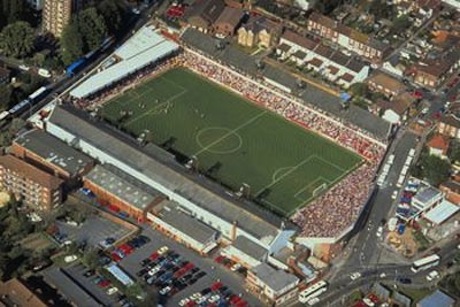(单词翻译:单击)
情景对话
Todd: Now, Phil, you're from England and you're a big football fan.
托德:菲尔,你来自英国,你是忠实的足球迷。
Phil: Yeah, very much. Definitely. Football's one of my main passions in life.
菲尔:对,我是忠实球迷。绝对是。足球是我的最爱之一。
Todd: OK, I'm a huge American football fan, and I know American football there's a certain process when you go the game that happens on game day. Can you talk about what happens when you go watch a British match, like a Premiere League match? Like what's the routine from morning to night? Like if you're a fan?
托德:好,我是橄榄球的忠实球迷,我知道去现场看橄榄球比赛有一套特定的流程。你能谈谈在英国看足球的情况吗,比如英超比赛?有比赛的那天,球迷从早上到晚上会做些什么?
Phil: If it's a home game then I guess I leave about two hours before the game. I arrive at the stadium and go the bar and have like a drink of beer before the game, and then I'll always wear my football kit: my shirt and my scarf; and then I'll go the game. I'll find my normal place in the stand, cause I always stand or sit in the same place. It's kind of tradition. It's like my routine, and then for about half-an-hour before the game, the stadium starts to fill up, the supporters start to make a lot of noise and they start to get behind the team and everyone... the adrenaline's flowing, and there's a few opposition supporters and it's generally kind of banter between the supporters whilst the players are warming up on the pitch.
菲尔:如果是主场比赛,我会提前两小时出门。抵达球场后我会去酒吧,在比赛前喝杯啤酒,一般我会穿球衣、戴上球队毛巾这样的足球装备去看比赛;然后就可以进球场了。然后我会进球场在看台上找到我常做的位置,因为通常我会站或坐在同一个地方。这有点像习惯。这些是我一般会做的事情,在比赛开始前半小时,球场会渐渐坐满,球迷开始呐喊,为球队加油,所有人的肾上腺素都开始飙升,球场里也会有一些对方球队的球迷,球员在场上热身时双方球迷会互相开玩笑。
Todd: Right, and then what happens like during the game? In British soccer you have a lot of songs, correct?
托德:好,那之后比赛进行时会发生什么?英国球迷在比赛期间会唱很多歌,对吧?
Phil: Yeah, there's a lot of songs. Generally they're either supporting the team or insulting the other team or local rivals.
菲尔:对,会唱很多歌。一般这些歌曲是为了支持主队,或是为了羞辱对方球队。
Todd: Right, right. And like how do you know when to sing? Like somebody just bursts out in song or do you have a leader or?
托德:好,好。那你们怎么知道什么时候开始唱歌呢?是有人突然开始唱歌,还是你们有领唱的人?
Phil: I've always wondered this. There's no designated leader but there's always a group that starts song or, there must be someone who does it, but I've never actually never know who or why, but it just seems that everyone spontaneously starts to sing at the same time and a certain song.
菲尔:我也很好奇。并没有预先选好的领唱人,不过会有一些人先开始唱歌,一定会有一些人起头,不过我一直不知道是谁在领头,也不知道为什么他们会领头,不过感觉像是所有人都自发地同时开始唱同一首歌曲。
Todd: Now is it always the same songs, or do the team come up with new songs from time to time?
托德:那你们是会唱同样的歌,还是球队会不定期地更换新歌?
Phil: The team doesn't come up with any of them, the supporters do. Generally there's a set hard core group of songs for each team that you have and then there's occasionally specialty songs. If it's a local derby game against someone you really don't like, then there's specialty songs for that game, or a few new ones come up depending on events that have been happening, so maybe one of the players have been in the news recently. They'll be a song about the player or something.
菲尔:球队不会换新歌,这是球迷做的事情。一般每个队都有固定的核心歌曲,偶尔会有一些特别的歌曲。如果是同城德比,而对方球队是你特别讨厌的队,那那场比赛中就会唱特别歌曲,依据所发生的情况,也会唱一些新歌,也许有一名球员正处在新闻焦点,那就会唱一首与那名球员有关的歌。
Todd: That's cool. So you said "derby", that's your team?
托德:真酷。你刚说德比,那是你支持的球队吗?
Phil: Derby is the term when a local game... when you play like your rival team, we call it like a local derby in English football.
菲尔:德比是指你支持的球队与同一个地区的对手队的比赛,这种比赛在英国足球里称为同城德比。
Todd: Oh, really?
托德:哦,真的吗?
Phil: Yeah, yeah, yeah.
菲尔:对,对,没错。
Todd: It's called a local derby.
托德:这称为同城德比。
Phil: Derby is also the name of the team, but that's just coincidence.
菲尔:德比也是一只球队的名字,不过这只是巧合。
Todd: Oh, OK. So, derby means when you play your rival team?
托德:哦,好,所以德比是指你支持的球队同对手队的比赛?
Phil: Yeah, you play a local team, a team that's based near to you. It's called a derby game.
菲尔:是你的球队与同一个地区的球队的比赛,同附近球队的比赛。称为德比。
Todd: A derby game. And it's D-A-R-B-Y?
托德:德比。拼写是D-A-R-B-Y吗?
Phil: D-E.
菲尔:是D-E。
Todd: Oh, so it's like derby. OK.
托德:哦,德比。好。
Phil: Yeah.
菲尔:对。
Todd: Got it.
托德:我明白了。
Phil: In English, we pronounce it derby, yeah.
菲尔:英语中的发音是这样的。
Todd: Derby! OK, interesting. OK, sorry... Do you ever go the away games?
托德:德比!好,真有意思。好,抱歉……你去看过客场比赛吗?
Phil: Yeah. Yeah, I used to travel quite a lot. I once traveled nine hours to an away game.
菲尔:去过,我经常去各地看比赛。有一次我坐了九个小时的车去看客场比赛。
Todd: Wow!
托德:哇!
Phil: And my team lost that day. And because we lost, we went down to the league below. I was not very happy on the way home.
菲尔:而我支持的队在那场比赛中输了。因为球队输了那场比赛,还降了级。我在回家的路上特别不开心。
Todd: What a terrible day.
托德:真是糟糕的一天。
Phil: Yeah, yeah. But we kind of knew we were going to lose because my team was very bad that year and the opposition was a very strong team so it's kind of everyone's attitude. We expected to lose, so we went there in a party spirit anyway so it wasn't so bad.
菲尔:对,不过我们之前已经知道我们会输,因为我支持的球队在那年的联赛中踢得非常差,而对手队又是一只非常强的球队,所以所有人都知道会输。我们知道我们会输,所以我们以开派对的心态去看了比赛,所以还不算太糟。
Todd: Well, cool. Thanks for talking about the Premiere League.
托德:嗯,真酷。谢谢你和我们谈论英超联赛。
Phil: Anytime, I love football.
菲尔:我随时乐意,我爱足球。

译文属可可原创,仅供学习交流使用,未经许可请勿转载
重点讲解
重点讲解:
1. fill up 挤满;占满;充塞;
例句:The room soon filled up with people.
房间里很快就完全挤满了人。
2. warm up (为体育比赛) 热身,做准备活动;
例句:Carl slipped a disc in his back while warming up.
热身时卡尔腰椎间盘不慎错位了。
3. burst out 突然…起来;
例句:The class burst out laughing.
全班突然大笑起来。
4. used to do sth. 过去常常;过去曾;
例句:We used to hear the train whistle at night.
过去我们常会在晚上听到火车的汽笛声。
5. come up with 想出,提出(计划、想法等);
例句:Peggy has come up with this fantastic idea for a party.
佩吉提出了这样一个异想天开的聚会计划。
6. from time to time 不时地;间或;偶尔;
例句:She has to work at weekends from time to time.
她偶尔周末还得工作。


